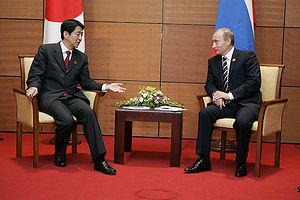Japanese Prime Minister Shinzo Abe has been Brussels this week attending the G7 summit, a gathering marked by the absence of Russian President Vladimir Putin. While the ongoing crisis in Ukraine has absorbed much of the meeting’s bandwidth, Abe has managed to insert issues important to Japan, while also trying to maintain a conciliatory tone toward the missing Russian representative. Japan’s complex relationship with Russia has caused Abe to walk a fine line in singling out Moscow as the cause of Ukraine’s internal strife.
After the first day of discussions on Wednesday, Abe was quoted by the Japan Times as saying “any attempt to change the status quo by force is intolerable in connection with both the Ukrainian and East Asian situations. This view was shared across the G-7.” In order to create lasting stability in Ukraine, Abe said Japan would provide economic assistance. The deputy Japanese chief Cabinet secretary, Hiroshige Seko, said the European Union leaders and Abe had also agreed that maritime disputes with China in the South China Sea should be resolved through international law.
By Thursday Abe had become more vocal in his desire to quash the ongoing dispute with Russia, saying “Under normal circumstances, President (Vladimir) Putin would have been attending this summit… I want Russia to be involved in various issues concerning the international community in a constructive manner. That’s what the world desires too. To this end I’m hoping to continue dialogue with President Putin,” according to Reuters. This statement came the day after the G7 said it would impose stricter sanctions on Moscow if it did not help in decreasing tension in eastern Ukraine.
Abe also called on China and Russia separately to hold talks with Japan. He said Russia had a role to play in resolving international issues, and that he hoped to continue their dialogue, after having met with Putin five times during his first year as prime minister. The Jiji Press reported that Abe also called on China to accept a summit meeting, and that “the door to dialogue is always open. China should play a responsible and constructive role in ensuring regional peace and stability.”
As Japan has hopes of signing future natural gas deals with Russia, as well as resolving their dispute over the Kuril Islands (Northern Territories to the Japanese), Abe’s friendly statements toward Putin are understandable. The proposal to hold a summit meeting with China is interesting however, considering the heated exchange the two countries had during the Shangri-La Dialogue last weekend. It appears Japan is attempting to calm the situation, after making its point concerning the rule of law in solving maritime issues. However, Japan has not suggested international arbitration with China over their maritime dispute concerning the Senkaku/Diaoyu Islands. For now, that appears to be a bridge too far for the Japanese government.
































